MDZS Vol 2 Annotations, Part 4
MDZS Vol 2 Annotations, part 4
Here is Part 4 of my annotations of MDZS Volume 2, pages 199 - 279.

(Silly as it may seem to you, I drink alcohol so rarely that "drinks" to me means "water / tea / soda". Conveniently, Chinese has a word for "alcohol" specifically.)





























More Posts from Weishenmewwx and Others
Ever see a depiction of St. George and the Dragon? It's pretty fair to say if you've seen one, you've seen them all: Georgie on a horse stabbing a flailing dragon creature, princess piously kneeling in the background, vague landscape alluding to the homeland of the artist's patron.
The most varied part is the dragons. No one had a real definition for the thing, it seemed. For your pleasure and entertainment, I have ranked some medieval depictions based on how impressive George's feat seems once you see the dragon.
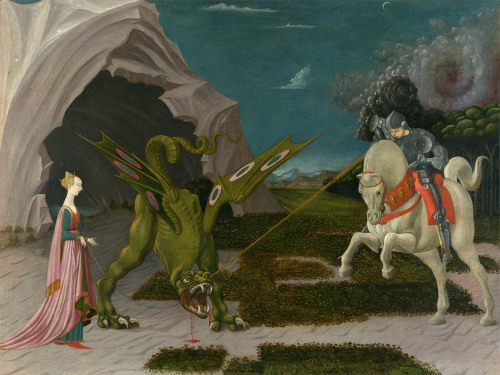
Paolo Uccello, 1456
This is a terrifying beast. The hell is that. Uccello was one of the first experimenters with perspective, so the thing also looks surreal, like it's taking place on Mars, or a Windows 95 screensaver. I would not want to fight that, I would not want to be tied to that. (Sometimes the princess is tied to the dragon for some reason.) 10/10
Horse thoughts: Maybe if I look at the ground it will be gone when I look up
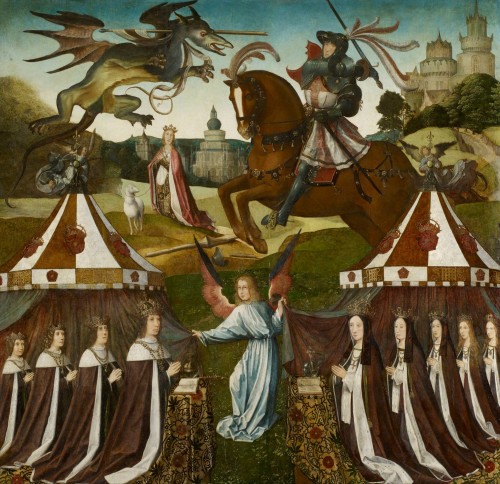
Unknown artist, c. 1505
This is a rare change of form for the dragon; it's the only one I've seen actually flying (or at least falling with style). It doesn't look particularly deterred by the spear through its throat, either. Also, George looks appropriately nervous. On the other hand, it hasn't got teeth, it seems to be fuzzy rather than having scaly armor, and George is bolstered by his army of Henry VII and his children, most of whom definitely didn't actually die in infancy. Still, wouldn't want to fight it, wouldn't want my pet sheep near it. (Sometimes the princess has a pet sheep for some reason.) 9/10
Horse thoughts: I am so glad I wore my mightiest feather helmet for this
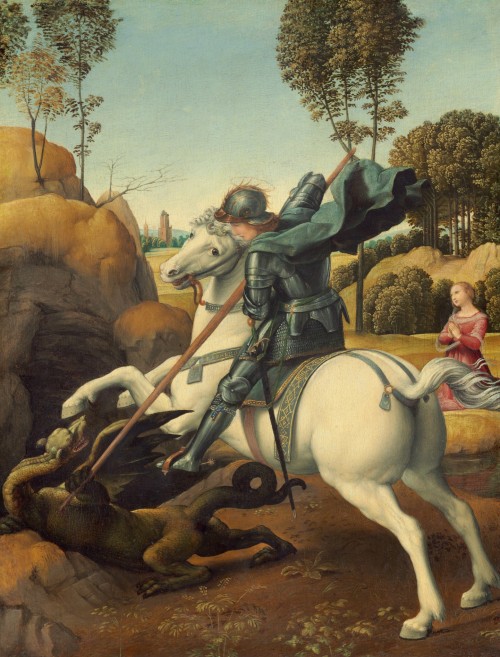
Raphael, 1505
We are coming to Dragons With Problems. This guy looks about comparable in size to George, and does have wings, but doesn't seem to be using these things to his advantage (and has he only got one wing?) And how does he deal with the neck? He does have a comically small head, but holding it up with such a twisty neck seems complicated at best. But most egregiously, he is doing the shitty superheroine pose where he is somehow simultaneously showcasing his chest and his butt, with its unnecessarily defined butthole (more on this later) (regrettably). 8/10 bc it's Raphael
Horse thoughts: AM I THE BESTEST BOI? AM I DOING SUCH A GOOD JOB? WE R DRAGON SLAYING BUDDIEZ
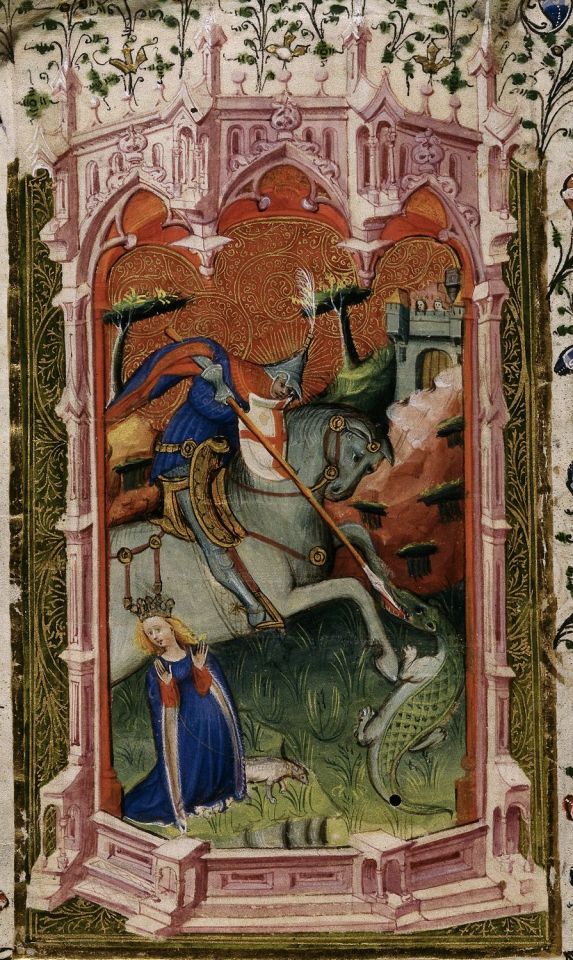
The Beauchamp Hours, c. 1401
We had a spirited debate about this one at work. Again, the dragon has gotten smaller, and this one hasn't got even one wing. He's basically a crocodile. So the debate became: would you want to fight a crocodile if you had a horse and a pointy stick? Would the horse trample the animal, who can't get on its hind legs, or freak out and throw its rider? Would the pointy stick be enough to pierce the croc's thick hide? In this case, George seems to be controlling his horse and putting his pointy stick in the dragon's weak spot, so we can be impressed by his skill and strategy. However, his hat is dumb. 7/10
Horse thoughts: Dehhhh
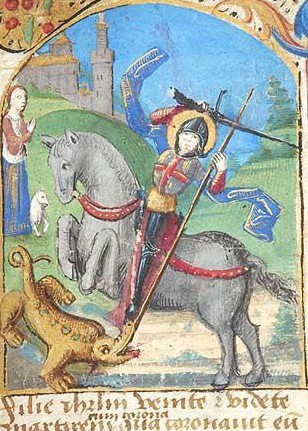
Book of Hours, c. 1480
Here we have the same kind of croco-dragon, but George's focus on his strategy has gone out the window. He's flailing around, not even looking at his target, he's about to lose his pointy stick, he hasn't got a hand on the reins, and his sword seems to only be poking the invisible dragon over his shoulder. All he's got going for him is that his hat is slightly less dumb. 6/10
Horse thoughts: Yay, new friend! Come play with me, new fr- what is happening
Final dragons put behind this Read More for your safety:

Rogier van der Weyden, c. 1432
I'm thinking this guy is at least semi-aquatic. Webbed feet, wings that seem more like fins, bipedal but top-heavy, jaws that seem more for scooping than biting. Maybe she's crawled up here from the nearby body of water to lay her eggs, and this is all a big misunderstanding. Moreover, George's dagged sleeves seem entirely impractical for the situation. 5/10
Horse thoughts: i got my hed stuk in a jar and now it is this way forever

Unknown artist, c. 15th century
I hate this. I hate everything about it. Why has it got human eyes and teeth. Why is its nose melting. Why has it got a dick on its face and balls under its chin. The fin/wings are back but they look even more useless. Also, George is shifty as hell, schlumped over in his saddle with his bowler hat thing over his eyes. The baby dragon at the bottom eating some hapless would-be rescuer is kind of metal. 4/10 at least the thing is gonna die
Horse thoughts: I Have Smoked So Much Crack

Book of Hours, c. 1450
Remember what I said about the buttholes? First, sorry. Second, yeah, we're back to that. I'll admit this one is less about the danger from the dragon itself than the very specific choices the artist has made. They didn't need to do that. It's a lizard. They don't even have. And it's like they had an orifice budget and they skipped an exit wound for the spear to focus. Elsewhere. It's so detailed. And George had an even dumber hat. 2/10 take it away
Horse thoughts: I Have Smoked So Much Weed
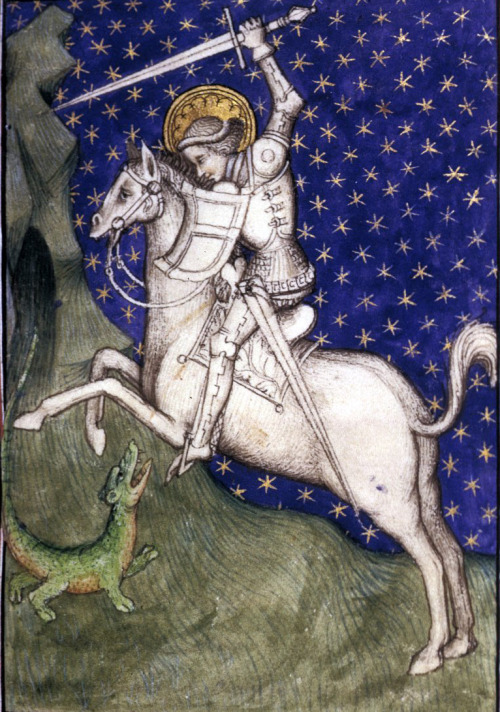
Book of Hours, c. 1415
This is just bullying. There isn't even a princess. That is clearly an infant. Look at that smug look on George's face as he swings his sword that's bigger than the whole little guy. This is the equivalent of when DJT Jr. hunted those sleeping endangered sheep. 1/10
Horse thoughts: ....yikes

And this is the previous one, but now the baby dragon is cute. He's chubby. He's got toe beans. He's Puff the Magic Dragon. His eyes have already gone white, implying that George is just kicking its corpse around for funsies. What's the difference between the dragon and the lamb in the background? That the dragon is dead, like our innocence. This George is truly deserving of the dumbest hat of all. 0/10 plus one more butthole for the road
Horse thoughts: Perhaps it is we who are the buttholes.

This is soooooo interesting. The Romans were the ancient world’s materials-technology engineers par excellence: this is just another example of it.
Hi,, I hope I'm not bothering you with this and I'm sorry if my English isn't good, I hope you can understand my questions. I've been thinking about this for a while now and I tried to find information online but I found nothing.
MDZS is the first Chinese Novel I've read and I still haven't finished it yet,,but I've heard about rumors that said that MXTX is in jail, because she sold copies of her books. The rumor isn't true, however it made me wonder something,, I know China's censorship on lgbt related stuff is really heavy and that's why the donghua and drama adaptations of MDZS and other bl works are censored, but I didn't know that authors couldn't sell their novels.
So my question is,, how does MXTX earn money if she isn't allowed to sell her works? She has already finished 3 Danmei novels, and her works are really popular, they even have manhua, donghua or drama adaptations. The adaptations have earned quite a lot of money, but since she's an anonymous writer, does part of it even go to her?
To make the drama, the donghua and the manhua, producers had to ask her permission, I think. So, since the adaptations are doing well, she should get part of the profit, but how does it work? If the Chinese Government really is against lgbt themed works, shouldn't they have done something about her?
I really love her works and I hope that she earns something since she is the one that created all of them. Thanks for considering my question!!
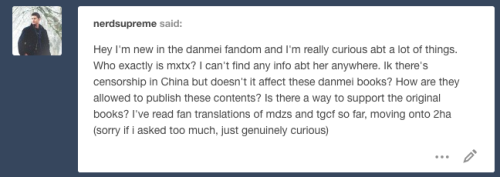
Hi both of you and welcome to the cnovel fandom! Quick intro of the author, MXTX uses a pen name like many webnovel authors, it’s the abbreviation of Mo Xiang Tong Xiu which literally means “Ink Fragrance, Copper [Money] Stench” (墨香铜臭). Fun fact, it’s her mother who coined that name. MXTX wished to pursue a major in literature during university but her mother wanted her to graduate in economy instead while keeping writing on the side, that way she would have the fragrance of ink in one hand and the stench of money in the other.
We also know that she is fairly young, she wrote Scum Villain while she was a university student and she started working on the outline of MDZS in her final year. Tian Guan Ci Fu (Heaven Official’s Blessing) is the third book she completed and a fourth novel is/was in the works, its provisional title is “No rest for the death god” and is supposed to be a supernatural story taking place in a modern setting.
MXTX is one of the most popular webnovel authors on Jinjiang Literature City, the webnovel platform, but her popularity also comes with a great many detractors. You’ve heard some of the malicious rumours circulating in the English-speaking side of the fandom, it’s just a drop in the ocean compared to the outpouring of heated controversies in the Chinese side as the latter can have real-life consequences. There is a different nexus between the creator and the audience and the fandom culture is not the same either, it can be quite deleterious due to the tendency to report any content that one disagrees with.
Censorship in China is... ever-changing and nebulous. How severe it is depends on the medium. Nevertheless, gay literature (同志文学) does exist in China and it is distinct from danmei. I also want to nuance a bit the pervasive idea that anything lgbt is systematically and relentlessly censored in China. The reality is more complex than that and it would be dismissive of the hard-fought gains and visibility that Chinese lgbt activists have obtained these past two decades (some concrete examples: the work of the lgbt centre in Beijing or the pride festival in Shanghai). I don’t know if people are aware of this but lgbt dating apps are thriving in China, the most popular one, Blued, is also the largest lgbt social network worldwide. With that said, the official policy towards homosexuality is the three No’s: “no approval, no disapproval, no promotion”. A stance comparable to the “don’t ask, don’t tell”. It’s not explicit persecution but it manifests in the silencing of public discussion and the limiting media representation of homosexuality. In 2017, the top media regulator issued guidelines banning a number of things, this included obscene and violent content, homosexuality, superstitious pseudoscience (such as reincarnation or spirit possession). On top of that, there is also an ongoing crackdown on online pornography that gets increasingly intense. And that concerns everyone on the internet, it’s astonishing the lengths netizens will go to in order to circumvent the censorship, new slang is developed to refer obliquely to banned words, fanfics are published in image format to prevent text recognition, etc... The censorship might be increasingly prevalent but netizens push back with their resourcefulness. Pushing back is also not without significant risk. Perhaps you have heard of the case of the danmei author that received a severe jail sentence? A few Western media picked up on that and criticised the ruling that was deemed homophobic. Chinese reactions tell a slightly different story, the author's crime was not writing danmei, she was in fact accused of making a profit by illegally producing and disseminating pornographic material. I’m not too keen on the details but it seems she printed the books herself and sold them online. To some Chinese observers, the ruling was not discriminatory because she did break the law. To others, it was absurd because this law dates from an era when internet barely existed and it would have been much more laborious to mass-produce and share porn at that time. There’s a bit of truth in all these points of views. It’s also not disingenuous to say that lgbt content is more likely to be targeted than het content even if the charges are not directly lgbt-related.
Usually contracted authors of webnovel platforms have a more secure status. They get a fee from the purchase of VIP chapters as well as tips from the readers. Other sources of revenue arise when webnovels get popular enough to get the opportunity to be published through official channels or when adaptation rights are sold (I assume that the author receives a share of that deal but perhaps does not get any further financial gain from the adaptation or its merch).
To support the author, I would suggest purchasing TGCF on Jinjiang (guide) or buying the physical versions of her three novels in Chinese (shop, change to English with top-right world icon), the special boxsets of MDZS and TGCF come with tons of goodies!
Hope I could be of service and that my tirade was mildly informative ^^'
I also just read Sha Po Lang! Those weapons and flying ships and wings have been in my head for months now - it’s lovely to see what they look like (according to idledee, which is gospel enough for me).










ive been reading sha po lang!
Here is Part 2 of my annotations of First Edition MDZS, Volume 1, pages 87 - 147.








"More missing text!"
"Why are there extra sentences in the English version?"
there's a very simple explanation here called "pipi likes to edit" 😅
。゚ヽ(゚´Д`)ノ゚。 Why?!? Why?!?!!
Hi! I just wanna say I think that your sharing notes on mdzs books are absolutely freaking cool!!!!! When I'll finally get my hands on the books can I copy your notes, please??
(Ps sorry for my english)
Please copy them! That’s what they’re for ♥️
Book / Author recommendation time! Please support Daniel May so that he can keep writing so that we can keep reading his work ❤️.
Daniel May (best pen name ever 😉) recently released Blood Sports, previously working-titled Equestrian Mafia Daddy. You can read it on Kindle Unlimited, buy it a bunch of places?, and/or join his Patreon for it and more.
Here’s one of my favorite lines from this book:

And another:

I first read his work in AO3, Yi City fanfic. He made all the Yi City pain go away… (except for all the super scary painful angsty stuff he also writes, but he tags his fics well, so I know what to reread and what to avoid).
If stories are food (well, ingestibles), Daniel May is my pusher, and I hope you’ll get hooked, too.
I recently started keeping a list of all the ways I hear/read Chinese people say "death / dying". This has got to be the most artistic rendition of that question that I have seen to date :)
hello there, hope you're having a nice day <3
so i've been reading a lot of fics lately, uk for sanity's sake, and i've noticed that in most of them, lwj doesn't use contractions (eg., says do not instead of don't)?? and i think he doesn't in the novel either but i don't remember lol so i can't be sure but anyway that made me curious - does chinese have contractions as well? does he not use it bc it's informal?
hello there! I’m doing all right, i started to answer this ask while waiting for a jingyeast loaf to come out of the oven 😊 many thanks to @bookofstars for helping me look over/edit/correct this post!! :D
anyways! the answer to your questions are complicated (of course it is when is anything simple with me), so let’s see if I can break it down--you’re asking a) whether chinese has contractions, b) if it does, how does they change the tone of the sentence--is it similar to english or no?, and c) how does this all end up with lan wangji pretty much never using contractions in english fic/translation?
I’m gonna start by talking about how formality is (generally) expressed in each language, and hopefully, by the end of this post, all the questions will have been answered in one way or another. so: chinese and english express variations in formality/register differently, oftentimes in ways that run contrary to one another. I am, as always, neither a linguist nor an expert in chinese and english uhhh sociological grammar? for lack of a better word. I’m speaking from my own experience and knowledge :D
so with a character like lan wangji, it makes perfect sense in english to write his dialogue without contractions, as contractions are considered informal or colloquial. I don’t know if this has changed in recent years, but I was always taught in school to never use contractions in my academic papers.
However! not using contractions necessarily extends the length of the sentence: “do not” takes longer to say than “don’t”, “cannot” is longer than “can’t” etc. in english, formality is often correlated with sentence length: the longest way you can say something ends up sounding the most formal. for a very simplified example, take this progression from least formal to absurdly formal:
whatcha doin’?
what’re you doing?
what are you doing? [standard colloquial]
may I ask what you are doing?
might I inquire as to what you are doing?
excuse me, but might I inquire as to what you are doing?
pardon my intrusion, but might I inquire as to what you are doing?
please pardon my intrusion, but might inquire as to the nature of your current actions?
this is obviously a somewhat overwrought example, but you get the point. oftentimes, the longer, more complex, more indirect sentence constructions indicate a greater formality, often because there is a simultaneous decreasing of certainty. downplaying the speaker’s certainty can show deference (or weakness) in english, while certainty tends to show authority/confidence (or aggression/rudeness).
different words also carry different implications of formality—in the example, I switched “excuse me” to “pardon me” during one of the step ups. pardon (to me at least) feels like a more formal word than “excuse”. Similarly, “inquire” is more formal than “ask” etc. I suspect that at least some of what makes one word seem more formal than one of its synonyms has to do with etymology. many of english’s most formal/academic words come from latin (which also tends to have longer words generally!), while our personal/colloquial words tend to have germanic origins (inquire [latin] vs ask [germanic]).
you’ll also notice that changing a more direct sentence structure (“may I ask what”) to a more indirect one (“might I inquire as to”) also jumps a register. a lot of english is like this — you can complicate simple direct sentences by switching the way you use the verbs/how many auxiliaries you use etc.
THE POINT IS: with regards to english, more formal sentence structures are often (not always) longer and more indirect than informal ones. this leads us to a problem with a character like lan wangji.
lan wangji is canonically very taciturn. if he can express his meaning in two words rather than three, then he will. and chinese allows for this—in extreme ways. if you haven’t already read @hunxi-guilai’s post on linguistic register (in CQL only, but it’s applicable across the board), I would start there because haha! I certainly do Not have a degree in Classical Chinese lit and she does a great job. :D
you can see from the examples that hunxi chose that often, longer sentences tend to be more informal in chinese (not always, which I’ll circle back to at the end lol). Colloquial chinese makes use of helping particles to indicate tone and meaning, as is shown in wei wuxian’s dialogue. and, as hunxi explained, those particles are largely absent from lan wangji’s speech pattern. chinese isn’t built of “words” in the way English is—each character is less a word and more a morpheme—and the language allows for a lot of information to be encoded in one character. a single character can often stand for a phrase within a sentence without sacrificing either meaning or formality. lan wangji makes ample use of this in order to express himself in the fewest syllables possible.
so this obviously leads to an incongruity when trying to translate his dialogue or capture his voice in English: shorter sentences are usually more direct by nature, and directness/certainty is often construed as rudeness -- but it might seem strange to see lan wangji’s dialogue full of longer sentences while the narration explicitly says that he uses very short sentences. so what happens is that many english fic writers extrapolated this into creating an english speech pattern for lan wangji that reads oddly. they’ll have lan wangji speak in grammatically incoherent fragments that distill his intended thought because they’re trying to recreate his succinctness. unfortunately, English doesn’t have as much freedom as Chinese does in this way, and it results in lan wangji sounding as if he has some kind of linguistic impediment and/or as if he’s being unspeakably rude in certain situations. In reality, lan wangji’s speech is perfectly polite for a young member of the gentry (though he’s still terribly rude in other ways lol). he speaks in full, and honestly, quite eloquent sentences.
hunxi’s post already has a lot of examples, but I figure I’ll do one as well focused on the specifics of this post.
I’m going to use this exchange from chapter 63 between the twin jades because I think it’s a pretty simple way to illustrate what I’m talking about:
蓝曦臣道:“你亲眼所见?”
蓝忘机道:“他亲眼所见。”
蓝曦臣道:“你相信他?”
蓝忘机道:“信。”
[...] 蓝曦臣道:“那么金光瑶呢?”
蓝忘机道:“不可信。”
my translation:
Lan Xichen said, “You saw it with your own eyes?”
Lan Wangji said, “He saw it with his own eyes.”
Lan Xichen said, “You believe him?”
Lan Wangji said, “I believe him.”
[...] Lan Xichen said, “Then what about Jin Guangyao?”
Lan Wangji said, “He cannot be believed.”
you can see how much longer the (pretty literal) english translations are! every single line of dialogue is expanded because things that can be omitted in chinese cannot be omitted in english without losing grammatical coherency. i‘ll break a few of them down:
Lan Xichen’s first line:
你 (you) 亲眼 (with one’s own eyes) 所 (literary auxiliary) 见 (met/saw)?
idk but i love this line a lot lmao. it just has such an elegant feel to me, probably because I am an uncultured rube. anyways, you see here that he expressed his full thought in five characters.
if I were to rewrite this sentence into something much less formal/much more modern, I might have it become something like this:
你是自己看见的吗?
你 (you) 是 (to be) 自己 (oneself) 看见 (see) 的 (auxiliary) 吗 (interrogative particle)?
i suspect that this construction might even be somewhat childish? I’ve replaced every single formal part of the sentence with a more colloquial one. instead of 亲眼 i’ve used 自己, instead of 所见 i’ve used 看见的 and then also added an interrogative particle at the end for good measure (吗). To translate this, I would probably go with “Did you see it yourself?”
contained in this is also an example of how one character can represent a whole concept that can also be represented with two characters: 见 vs 看见. in this example, both mean “to see”. we’ll see it again in the next example as well:
in response to lan xichen’s, “you believe him?” --> 你 (you) 相信 (believe) 他 (him)? lan wangji answers with, “信” (believe).
chinese does not do yes or no questions in the same way that english does. there is no catch-all for yes or no, though there are general affirmative (是/有) and negative (不/没) characters. there are other affirmative/negative characters, but these are the ones that I believe are the most common and also the ones that you may see in response to yes or no questions on their own. (don’t quote me on that lol)
regardless, the way you respond to a yes or no question is often by repeating the verb phrase either in affirmative or negative. so here, when lan xichen asks if lan wangji believes wei wuxian, lan wangji responds “believe”. once again, you can see that one character can stand in for a concept that may also be expressed in two characters: 信 takes the place of 相信. lan wangji could have responded with “相信” just as well, but, true to his character, he didn’t because he didn’t need to. this is still a complete sentence. lan wangji has discarded the subject (I), the object (him), and also half the verb (相), and lost no meaning whatsoever. you can’t do this in english!
and onto the last exchange:
lan xichen: 那么 (then) 金光瑶 (jin guangyao) 呢 (what about)?
lan wangji: 不可 (cannot) 信 (believe)
you can actually see the contrast between the two brothers’ speech patterns even in this. lan xichen’s question is not quite as pared down as it could be. if it were wangji’s line instead, I would expect it to read simply “金光瑶呢?” which would just be “what about jin guangyao?” 那么 isn’t necessary to convey the core thought -- it’s just as how “then what about” is different than “what about”, but “then” is not necessary to the central question. if we wanted to keep the “then” aspect, you could still cut out 么 and it would be the same meaning as well.
a FINAL example of how something can be cut down just because I think examples are helpful:
“I don’t know” is usually given as 我不知道. (this is what nie huaisang says lol) It contains subject (我) and full verb (知道). you can pare this straight down to just 不知 and it would mean the same thing in the correct context. i think most of the characters do this at least once? it sounds more literary -- i don’t know that i would ever use it in everyday speech, but the fact remains that it’s a possibility. both could be translated as “I do not know” and it would be accurate.
ANYWAYS, getting all the way back to one of your original questions: does chinese have contractions? and the answer is like... kind of...?? but not really. there’s certainly slang/dialect variants that can be used in ways that are reminiscent of english contractions. the example I’m thinking of is the character 啥 (sha2) which can be used as slang in place of 什么 (shen2 me). (which means “what”)
so for a standard sentence of, 你在做什么? (what are you doing), you could shorten down to just 做啥? and the second construction is less formal than the first, but they mean the same thing.
other slang i can think of off the top of my head: 干嘛 (gan4 ma2) is also informal slang for “what are you doing”. and i think this is a regional thing, but you can also use 搞 (gao3) and 整 (zheng3) to mean “do” as well.
so in the same way that you can replace 什么 with 啥, you can replace 做 as well to get constructions like 搞啥 (gao3 sha2) and 整啥 (zheng3 sha2).
these are all different ways to say “what are you doing” lmao, and in this case, shorter is not, in fact, more formal.
woo! we made it to the end! I hope it was informative and helpful to you anon. :D
this is where I would normally throw my ko-fi, but instead, I’m actually going to link you to this fundraising post for an old fandom friend of mine. her house burned down mid-september and they could still use help if anyone can spare it! if this post would have moved you to buy me a ko-fi, please send that money to her family instead. :) rbs are also appreciated on the post itself. (* ´▽` *)
anyways, here’s the loaf jingyeast made :3 it was very tasty.

